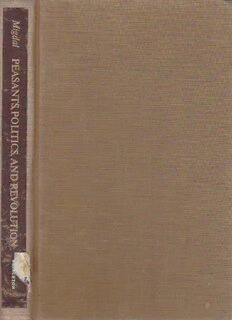
Peasants, Politics and Revolution: Pressures Toward Political and Social Change in the Third World PDF
Preview Peasants, Politics and Revolution: Pressures Toward Political and Social Change in the Third World
Peasants, Politics, and Revolution Joel S. Migdal PEASANTS, POLITICS, AND REVOLUTION Pressures toward Political and Social Change in the Third World PRINCETON UNIVERSITY PRESS Copyright © 1974 by Princeton University Press Published by Princeton University Press, Princeton, N.J. In the United Kingdom: Princeton University Press, Guildford, Surrey All Rights Reserved LCC 74-2972 ISBN 0-691-02177-5 (paperback edn.) ISBN 0-691-07567-0 (hardcover edn.) Printed in the United States of America First PRINCETON PAPERBACK Printing, 1977 To my parents, Benjamin and Rebecca Migdal CONTENTS Acknowledgments ix ι Introduction: Why Peasants Change 3 PART ONE The Historical Domination of Inward-Oriented Forces π Lord and Peasant 33 in The Freeholding Village 46 iv Mechanisms of Survival 60 PART TWO The Fulcrum Shifts: The Challenge of Outward-Oriented Forces ν Villages under Stress 87 VI RelievingtheStress 112 PART THREE The Triumph of Outward-Oriented Forces VII Who Risks Change? 133 VIII Social Structure and Social Institutions 156 PART FOUR Politics and Revolution ix The New Political Community 193 χ Peasant Revolution 226 χι Conclusion: The Shrinking World 257 Appendix A. The Scale of External Relations 267 Appendix B. A List of the Commu nities Used 269 Bibliography 275 Index 297 ACKNOWLEDGMENTS Far too many people had a hand in the ideas presented in this book for me to acknowledge them all adequately. Most likely, I am not even aware of the source of many of the concepts. I have attempted in the footnotes to show to where I turned when dealing with particular aspects of the problem. How ever, I would like to single out several people. Professor Samuel P. Huntington gave freely of his time from the inception of this project through its completion. I want to thank him for his unfailing support, as well as his useful comments. I am also grateful to Samuel L. Popkin who made incisive criticisms throughout. My interest in the plight of peasants was in part sparked by his commitment to the subject. Robert I. Rhodes gave me a long list of useful com ments which I have used throughout. Also, I would like to express my appreciation to John Dun can Powell, Frances R. Hill, Jeffrey Race, Jorge Dominguez, Shimshon Zelniker, Everett E. Hagen, Penina M. Glazer, Myron Glazer, and Barbara Kreiger. They all read earlier versions of various parts of the book and gave useful (and used) criticisms. The members of the Ford Foundation office in New Delhi helped make my stay in India, and particularly in Uttar Pradesh, enjoyable and productive. I particularly want to thank Dr. Johnson and Mr. Shri Nath Singh of the Agricultural Division. A special "thank you" goes to my wife Marcy. She was
